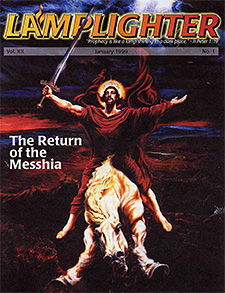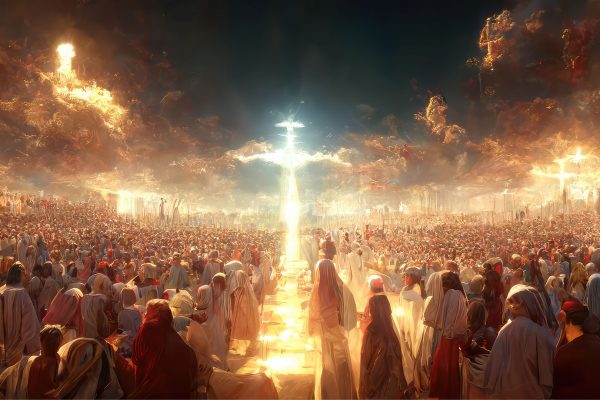The Return of the Messiah
The certainty of the Lord’s Coming Reign

Is Jesus Christ returning to this earth to reign over all the nations of the world? Most professing Christians in the world today would answer, “No!” They argue that Jesus will never put His feet on this earth again. They scoff at the very idea that the Lord would even be interested in returning to reign.
Where, then, does the minority view come from? Why do some Christians believe there will be a future, literal, and personal reign of Jesus over all the earth? Are these people victims of wishful thinking? Are they simply harboring a fanciful hope? Or, does their opinion have some basis in Scripture?
Could it possibly be that the majority viewpoint is wrong? If so, then how did the view develop, and what are its scriptural weaknesses and contradictions?
Like Night and Day
The two viewpoints are radically different. For example, the majority view holds that history as we know it will very soon end with the destruction of the earth. In sharp contrast, the minority view looks forward to the continuation of history in a glorious thousand year reign of the Lord here on this earth.
There is no future role for Israel in the majority viewpoint; God has washed His hands of the Jews. The minority view sees the Jews as a nation under discipline, temporarily set aside, but they believe a time is coming very soon when the Church will be taken out of the world, and God will once again focus on the Jews, bringing a great remnant of them to salvation in Yeshua, their Messiah.
The majority view sees no purpose left for this planet. It is polluted and despoiled. When the Lord returns, He will take the redeemed to live with Him forever in Heaven, and the earth will cease to exist, as will all the material universe. Those who hold the minority view believe that God intends to redeem the earth and all of His creation — the plant and animal kingdoms. Further, they believe that the earth will one day be returned to its original perfection and will serve as the eternal abode of the redeemed.
As you can see, the differences are like night and day. An outsider would undoubtedly conclude that the two groups have been reading a different book, for how could people read the same book and come to such totally different conclusions?
The Challenge of Truth Seeking
As the title of this article indicates, I believe the minority viewpoint on this central issue of Scripture is correct, and it is my intention to show you why I believe the Bible teaches that Jesus will return to reign.
I have not come to this conclusion casually. I grew up in a church that taught the majority viewpoint. It was drilled into me at an early age. The road that led me to a different view was a tortuous and painful one. It cost me friends. It brought condemnation upon my head. It finally forced me to leave the church where I had spent 30 years of my life.
But the rewards that come from following the truth of Scripture wherever it might lead are always greater than the disadvantages that may be incurred. Jesus said, “You shall know the truth, and the truth shall make you free” (John 8:32). But He qualified that promise with one condition that is usually overlooked. It is stated in the previous verse: “If you abide in My word” (John 8:31). That’s a big “if.”
As you read this article, I want to challenge you to put aside all preconceptions and traditions of men. Have an open heart, and test what I have to say by the Scriptures and not by the creed of your particular denomination.
I challenge you to be like the Bereans whom Paul commended as “more noble-minded than those in Thessalonica, for they received the word with great eagerness, examining the Scriptures daily, to see whether these things were so” (Acts 17:11).
The Biblical Statement
“Blessed and holy is the one who has a part in the first resurrection; over these the second death has no power, but they will be priests of God and of Christ and will reign with Him for a thousand years.” (Revelation 20:6)
One of the greatest misconceptions about Scripture that exists among Christians today is that Revelation 20 is the only place in the Bible that mentions a future earthly reign of Jesus. Nothing could be further from the truth; for the Bible, both Old and New Testaments, is full of references to a future reign of the Messiah on this earth.
But let me make something clear. If this passage in Revelation 20 were the only one in the Bible to speak of a future earthly reign of Jesus, I would still believe in such a reign. God doesn’t have to say something more than once for me to believe it. And God clearly says in Revelation 20 that Jesus will reign on this earth for 1,000 years.
The Flow of Events
In chapter 19 of Revelation Jesus returns to the earth and defeats the Antichrist and his false prophet. His next order of business is to bind Satan (Revelation 20:1-3). He then begins His reign with His saints.
Six times in Revelation 20:1-7 we are told that the reign of the Lord will last 1,000 years. Consider Revelation 20:4 for example. The verse says that the saints “came to life and reigned with Christ for a thousand years.” What could be clearer? What would God have to do to convince us that He means what He says? Does He have to put the message in the sky with blinking neon lights?
At the end of the thousand years, we are told that Satan will be released “to deceive the nations” (Revelation 20:8). He will rally the majority of Mankind in rebellion against the Lord, and they will march upon Jerusalem to overthrow the Lord’s kingdom. Notice that Revelation 20:9 says that all this action takes place “on the broad plain of the earth.” This is no ethereal battle between spirit beings in the heavens.
As the millennial rebels approach Jerusalem, they are destroyed by fire from heaven (Revelation 20:9), and Satan is thrown into the lake of fire (Hell) where he “will be tormented day and night forever and ever” (Revelation 20:10).
Imagination vs. Plain Sense
The message of Revelation 19 and 20 is very clear. A little child could understand it without interpretation. It takes a fanciful flight of imagination to explain away its obvious meaning.
But that is exactly what St. Augustine very successfully accomplished around 400 A.D. when he developed the Amillennial interpretation of Revelation 20. He did it by applying his imagination to the passage and spiritualizing it beyond recognition.
When he got through interpreting the events described in these two chapters, Revelation 19 had been transformed into a description of Christ’s battle on the Cross, and Revelation 20 had been turned into a description of the Lord’s spiritual reign over the world from Heaven through His Church. Satan’s binding was attributed to the Cross and not to the Second Coming.
In other words, Augustine argued that the Millennial reign of the Lord began at the Cross and will continue until He returns for His Church. That means that according to the Amillennial viewpoint we are in the Millennium now! It also means that the 1,000 years mentioned six times in chapter 20 really doesn’t mean 1,000 years. Rather, it is a symbolic number that stands for an indefinite period of time.
This incredibly imaginative interpretation that conflicts with the plain sense meaning of the passage was immediately adopted by the Roman Catholic Church in 431 A.D. It is still Catholic dogma to this day. It has also been adopted by all the liberal, mainline Protestant denominations. In short, this view of end time events is the one that is held by the vast majority of all professing Christians today.
The Imagination Trap
The basic flaw in the whole Amillennial interpretation of Revelation 19 and 20 is rooted in its denial of the plain sense meaning of the passages.
God knows how to communicate, and He desires to communicate. You do not have to have a Ph.D. in hermeneutics or an active imagination to understand His Word.
The book of Revelation begins with the words, “The revelation of Jesus Christ…” (Revelation 1:1). The word, revelation, in the Greek is “apocalypse,” which means “an unveiling.” The purpose of the book of Revelation is to reveal or unveil the ultimate triumph of Jesus over Satan. If God’s purpose is to reveal something so significant, why would He write it in a code language that a person cannot understand unless he has graduated from a seminary? It makes no sense.
Advocates of the Amillennial view usually respond by saying that Revelation is full of symbols. Yes, there is a lot of symbolic language in the book, but symbols have a plain sense meaning. They are not used pell-mell, and the reader does not have the freedom to assign any meaning to them that he pleases.
Furthermore, the fulfillment of First Coming prophecies provides the best rule of thumb for the interpretation of Second Coming prophecies. And any cursory examination of First Coming prophecies will quickly reveal that they were fulfilled in their plain sense meaning.
Take for example the prophecy in the book of Zechariah that says the Messiah will come on a donkey (Zechariah 9:9). If today’s Amillennial spiritualizers had lived in Old Testament times, I feel certain they would have denied the plain sense meaning of this verse. “Zechariah is apocalyptic literature,” they would have said, “and such literature never means what it says. Therefore, this verse must simply mean that the Messiah will be a humble person.” No, the verse meant what it said, and in fulfillment of it, Jesus made His triumphal entry into Jerusalem riding on a donkey.
The bottom line is that when you interpret Scripture imaginatively rather than for its plain sense meaning, you can make it mean whatever you want it to mean, and God’s message gets lost in flights of fancy.
Satan’s Activity
Another flaw in the Amillennial approach is its contention that the binding of Satan that is mentioned in Revelation 20:1-3 occurred at the Cross.
The first thing that must be kept in mind regarding this point is that Satan has always been bound in the sense that he has never had the freedom to do whatever he pleases. Many scholars consider Job to be the oldest book in the Bible. That book begins with Satan standing before the throne of God requesting permission to touch Job, his family, and his possessions. Satan is not omnipotent. He has always worked within parameters laid down by the Lord.
It is true that Satan was further bound by the Cross. As a result of our Lord’s work on the Cross, believers since that time have received the indwelling power of the Holy Spirit (Romans 5:5), and the Scriptures assure us that “greater is He who is in you than he who is in the world” (1 John 4:4). Thus, we now have greater power in resisting the temptations and attacks of Satan than did believers in Old Testament times.
But the binding of Satan that Revelation 20:1-3 says will mark the beginning of the Millennium is a special type of binding that did not occur at the Cross. Revelation says that Satan will be bound in such a way that he will no longer “deceive the nations” (Revelation 20:3).
As you look around the world today and observe the behavior of the nations, can you truly believe that they are no longer deceived? The fact of the matter is that they are terribly deceived. As in the time of David, the nations are “in an uproar,” and their rulers continue to “take counsel together against the Lord and against His Anointed” (Psalm 2:1-2).
Satan’s Continuing Rule
The third critical flaw in the Amillennial view is the idea that Jesus is reigning today over the nations of the world. This contention is really an insult to the Lord, for if He is ruling, He is doing a very poor job! We live in a world characterized by injustice, poverty, pestilence, and terrorism — to name only a few of our planet’s maladies.
The Word says that when the Lord reigns, “the earth will be full of the knowledge of the Lord as the waters cover the sea” (Isaiah 11:9). Is this true today? Has it ever been? Of course not!
We are told in 1 Peter 5:8 that Satan still prowls about “like a roaring lion, seeking someone to devour.” And in 1 John 5:19, written long after the Cross, we are told that “the whole world lies in the power of the evil one.” The Scriptures make it clear that Satan continues as “the ruler of this world” (John 12:31).
The Cross sealed the fate of Satan. He is a mortally wounded monarch who is desperately clinging to his kingdom. One day soon when the Lord returns, Satan will be crushed under the feet of the redeemed (Romans 16: 20). But the total defeat of Satan is yet future. It is one of the benefits of the Cross that has not yet become a reality in history.
Jesus’ Ultimate Triumph
As a result of the Cross, Jesus has won back the dominion over this earth that was lost by Adam and Eve when they sinned against God (Daniel 7:13-14 and Revelation 5:9-10). But, He is not yet exercising that dominion. The writer of Hebrews makes this point. He says that Jesus has been crowned with glory and honor and that God “has put all things in subjection under His feet” (Hebrews 2:7-8), but then he proceeds to observe: “But now we do not yet see all things subjected to Him” (Hebrews 2:8).
Some of the benefits of the Cross are delayed and will not be realized until Jesus returns. For example, the Cross guarantees the salvation of believer’s bodies, but that blessing of glorification will not be realized until “the revealing of the sons of God” (Romans 8:19). This phrase is a reference to the resurrection of the saints, something that Paul makes clear a few verses later (Romans 8:23).
In like manner, the Cross guarantees the total defeat of Satan and the ultimate triumph of Jesus as “King of kings and Lord of lords” (Revelation 17:14). But that triumph will not occur in history until the Lord returns. In this regard, Jesus is like David when he was anointed the King of Israel but then had to wait a long time before he took possession of his kingdom.
Accordingly, Jesus is not portrayed in Scripture as being a reigning king now. Rather, He is pictured as our High Priest before the throne of God (Hebrews 8:1). He is our mediator, our intercessor (Hebrews 9:11-16).
When He came the first time, He came as our Savior. He is now our Mediator. He will return as our Sovereign. Redeemer, Priest, and King — those are the three roles of Jesus — past, present, and future.
Revelation 19:11 says that when Jesus returns, His initial purpose will be to judge and make war against the enemies of God. But verse 16 reveals that His ultimate purpose will be to serve as “King of kings and Lord of lords.” Long before Revelation was written, the prophet Zechariah had revealed the same thing. In portraying the Lord’s return, He pictured the Lord destroying the nations rebelling against God, and when that work is completed, he states “the Lord will be king over all the earth” (Zechariah 14:9).
Revelation 19 and 20 clearly establish the fact that Jesus is going to return to reign — but there are other reasons I believe in such a future reign on this earth.
More Info
Concerning Jesus’ Second Coming, read more…
Concerning all the signs that we are at the end of this age, read more…




